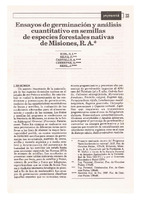Ensayos de germinación y análisis cuantitativos en semillas de especies forestales nativas de Misiones, R. A.
Date
1994-09-01Author
Eibl, Beatriz Irene
Silva, Fidelina
Carvallo, Ariel
Czerepak, R.
Kehl, J.
Metadata
Show full item recordAbstract
Un aspecto importante de la autoecología de las especies forestales nativas es el estudio de sus frutos y semillas. En este trabajo se realizó la determinación de las condiciones y porcentajes de germinación, medición de las características cuantitativas de frutos y semillas, la evaluación de las condiciones adecuadas para el almacenamiento y cosecha de las mismas. Los frutos y semillas del programa se recolectaron en la Provincia de Misiones, en áreas de la Selva Subtropical Oriental (Provincia Paranaense). Todos los ensayos se realizaron con lotes provenientes de diferentes zonas semilleras a los fines de abarcar la mayor heterogeneidad posible, en cuatro repeticiones de 25/50/100 semillas para ensayo de germinación (en invernáculo, sustrato de arena, arcilla y materia orgánica y a media sombra) y determinación del porcentaje de humedad de las semillas (en estufa hasta peso constante) siguiendo las Normas ISTA de ensayos de semillas. Los resultados se presentan como tablas indicando número de semillas por fruto, peso de semillas y frutos número de semillas y frutos por kilogramo,
especificándose que se trata de frutos frescos y maduros (momento fenológico de plenitud a fin de fase de maduración). Los ensayos de germinación permitieron clasificar aquellas especies que no necesitan ·tratamiento pregerminativo y presentan alto porcentaje de germinación (superior al 40%) caso del Tabebuia ipé y T. alba, Cedrela fissilis, Cabralea oblongifoliola , Myrocarpus frondosus, Trichilla catiguá, Eugenia spp., Parapiptadenia rígida, Lonchocarpus muehlbergianum, Eugenia guaviroba, Chrysophylum gonocarpum y Cupania vernalis. Aquellas que requieren un tratamiento pregerminativo como el caso de Peltophorum dubium, Enterolobium contortisiliquum, Gleditsia amorphoides y Apuleia leiocarpa, para mejorar el porcentaje de germinación y aumentar su energía germinativa y las especies que requieren de estratificación con abundante materia orgánica como es el caso de Euterpe edulis, Balfourodendron riedelianum y Holocalyx balansae. Especies corno Bastardiopsis densiflora, Cordia trichotoma y Patagonula americana con un porcentaje de germinación inferior al 20% exigen estudios más detallados. One the important aspect of the autecology of the native forest species was the study of their fruits and seeds by means of the determination of the conditions and percentages of gemination, the measurement of the quantitative characters of fruits and seeds and the evaluation of the proper conditions for the harvest and store of seeds. The fruits and seeds of the program were recollected in the Province of Misiones in areas of the Eastern Subtropical Forest (Paranaense Province). Ali the tests were realized with lots which come from different seed areas by way of achieve heterogeneousness. The tests were established in four repetitions of 25/50/100 seeds for the germination test (in green-house with half shadow and the soil composed of sand, clay and organic matter) and the determination of the moist percentage in seeds (in oven till constant weight) according to the ISTA Normas for seed test. The results are presented in tables showing the number of seeds per fruits, the weight of seeds and fruits, the number of seeds and fruits per kilogram, specifying that the fruits were fresh and ripe (phenologic moment of fullness to end of the maturity phase). The germination tests let to classify those species that do not need pregerminative treatments and present high percentage of germination (above 40%) as the Tabebuia ipe, T. alba, Cedrela f issilis, Cabralea oblongifolia, Myrocarpus frondosus, Trichilla catiguá, Chysophylum gonocarpum and Cupania vernalis. Those that need a pregenninative treatment as Peltophorum dubium, Enterolobium contortisiliquum, Gleditsia amorphoides and Apuleia leiocarpa , to improve the germination percentage and to increase their germinative energy and the species that need of stratification with plenty of organic matter as the Euterpe edulis, Balfourodend ronriedelianum and Holocalyx balansae. Species as Bastardiopsis densiflora, Cordia trichotoma and Patagonula americana with a germination percentage below 20% need more detailed studies.
Collections
- Revista Yvyraretá [360]
The following license files are associated with this item:




